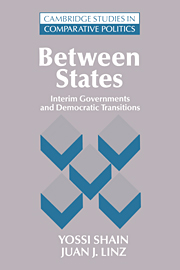Book contents
- Frontmatter
- Contents
- Preface
- Contributors
- PART ONE THEORY
- PART TWO CASE STUDIES
- 7 The provisional government and the transition from monarchy to Islamic republic in Iran
- 8 From revolution to democracy in Portugal: The roles and stages of the provisional governments
- 9 Accelerating collapse: The East German road from liberalization to power-sharing and its legacy
- 10 Interim government and democratic consolidation: Argentina in comparative perspective
- 11 The failure of an internationally sponsored interim government in Afghanistan
- 12 Electoral transitions in Yugoslavia
- 13 Democratization and the international system: The foreign policies of interim governments
- Index
12 - Electoral transitions in Yugoslavia
Published online by Cambridge University Press: 05 August 2012
- Frontmatter
- Contents
- Preface
- Contributors
- PART ONE THEORY
- PART TWO CASE STUDIES
- 7 The provisional government and the transition from monarchy to Islamic republic in Iran
- 8 From revolution to democracy in Portugal: The roles and stages of the provisional governments
- 9 Accelerating collapse: The East German road from liberalization to power-sharing and its legacy
- 10 Interim government and democratic consolidation: Argentina in comparative perspective
- 11 The failure of an internationally sponsored interim government in Afghanistan
- 12 Electoral transitions in Yugoslavia
- 13 Democratization and the international system: The foreign policies of interim governments
- Index
Summary
The devastating war in the republics of the former Yugoslavia has overshadowed the electoral transitions of 1990. Yet just as the decentralized politics of Yugoslavia through the 1960s to the 1980s laid the groundwork for separate, republic-level transitions, the results of the 1990 elections were crucial to the process of the state's demise. The issue on the agenda of the republic elections was the future of the Yugoslav state, although the final electoral playing-out of that issue was to await the plebiscites. The punctuated nature of the electoral transitions extended the process over the course of 1990, creating multiple transitions at the level of each republic.
Placing the Yugoslav transitions (with emphasis on the punctuated and plural nature of those transitions) in context of the framework developed here by Shain and Linz, it is evident that in all the cases the interim governments were incumbent caretaker governments. However, the interim governments conducting the elections were the variously renamed Communist party organizations of the republics, not the League of Communists of Yugoslavia (SKJ). Indeed after the Fourteenth Congress in January 1990, the SKJ no longer existed. Thus the determination of the transition variables of timing and electoral rules were at the discretion of the republic parties.
The dissolution of the SKJ meant that effectively there was no central arena in which the question of democratization and the future political order of the state was being discussed, elections were not called by a central state organization nor were voters choosing simultaneously for the same slate of candidates.
- Type
- Chapter
- Information
- Between StatesInterim Governments in Democratic Transitions, pp. 237 - 254Publisher: Cambridge University PressPrint publication year: 1995
- 1
- Cited by

